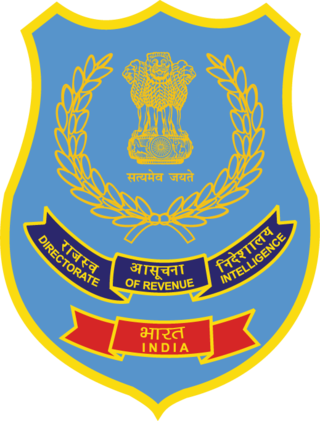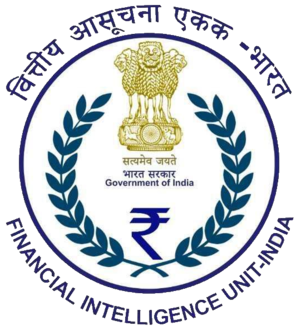
Law enforcement in India is imperative to keeping justice and order in the nation. Indian law is enforced by a number of agencies. Unlike many federal nations, the constitution of India delegates the maintenance of law and order primarily to the states and territories.

The Customs and Excise Department (C&ED) is a government agency responsible for the protection of the Hong Kong Special Administrative Region against smuggling; the protection and collection of revenue on dutiable goods on behalf of the Hong Kong Government; the detection and deterrence of drug trafficking and abuse of controlled drugs; the protection of intellectual property rights; the protection of consumer interests; and the protection and facilitation of legitimate trade and upholding Hong Kong's trading integrity.

The Department of Finance is the executive department of the Philippine government responsible for the formulation, institutionalization and administration of fiscal policies, management of the financial resources of the government, supervision of the revenue operations of all local government units, the review, approval and management of all public sector debt, and the rationalization, privatization and public accountability of corporations and assets owned, controlled or acquired by the government.

The Directorate of Revenue Intelligence (DRI) is an Indian intelligence agency. It is India's apex anti-smuggling intelligence, investigations and operations agency.

The Ministry of Finance is a ministry within the Government of India concerned with the economy of India, serving as the Treasury of India. In particular, it concerns itself with taxation, financial legislation, financial institutions, capital markets, centre and state finances, and the Union Budget.

The Royal Malaysian Customs Department is a government department body under the Malaysian Ministry of Finance. RMCD functions as the country's main indirect tax collector, facilitating trade and enforcing laws. The top management of JKDM is led by the Director General of Customs and assisted by 3 deputies, namely, the Deputy Director General of Customs Enforcement/Compliance Division, the Deputy Director General of Customs Customs/Inland Tax Division and the Deputy Chief Director of Customs Management Division. The Royal Malaysian Customs Department consists of several divisions, namely the Enforcement Division, the Inland Tax Division, the Compliance Division, the Customs Division, and the Technical Services Division.
The Economic Intelligence Council is the apex forum overseeing government agencies responsible for economic intelligence and combating economic offences in India. The Council is also the apex of 18 regional economic intelligence committees, and is part of the Union Ministry of Finance. It was formed in 1990.

The Narcotics Control Bureau is an Indian central law enforcement and intelligence agency under the Ministry of Home Affairs, Government of India. The agency is tasked with combating drug trafficking and the use of illegal substances under the provisions of Narcotic Drugs and Psychotropic Substances Act.

The Directorate General of GST Intelligence (DGGI) is a law enforcement agency under the Ministry of Finance responsible for fighting tax evasion in India. It was founded in 1979 as the Directorate General of Anti-Evasion and was later renamed the Directorate General of Central Excise Intelligence. The agency was renamed as Directorate General of GST Intelligence (DGGI) after the introduction of the Goods and Services Tax. The agency is part of NATGRID. The organisation is staffed by officers of Central Board of Indirect Taxes and Customs.

The Directorate of Enforcement (ED) is a law enforcement agency and economic intelligence agency responsible for enforcing economic laws and fighting economic crime in India. It is part of the Department of Revenue, Ministry of Finance, Government Of India. It is composed of officers from the Indian Revenue Service, Indian Police Service, and the Indian Administrative Service as well as promoted officers from its own cadre.

The Investigation Division of the CBDT, abbreviated as Inv-CBDT, is the revenue enforcement agency of the Central Board of Direct Taxes, Government of India. It functions under the Department of Revenue in the Union Ministry of Finance and is concerned with the collection and administration of, as well as enforcement and prosecution of cases related to, the various direct taxes accruing to the Union Government.
The Income Tax Air Intelligence Unit is a law enforcement agency, under the Ministry of Finance responsible for handling tax evasion and cross-border illegal trade in India in airports in consultation with the Central Board of Indirect Taxes and Customs and the CISF. It functions under the Zonal Deputy Director (Intelligence) Income Tax. The agency functions under the rules prescribed by its parent organisation to handle any intimidation in course of their new duty of checking and gathering intelligence on tax evasion in airports. Their mandate will soon be extended to Ports. The Election Commission of India has congratulated this agency on their path breaking efforts to fight tax evasion among politicians.

The Regional Economic Intelligence Committee is the apex forum overseeing government agencies responsible for economic intelligence and combating economic offenses in the respective states of India. The Committee is under the Economic Intelligence Council. It was formed in 1990. The head of the committee is usually the Director General of the Directorate General of Income Tax Investigation.
The Tax Administration Reform Commission or TARC is committee appointed by the Government of India for giving recommendations for reviewing the public Tax Administration system of India. The Union Finance Minister had made an announcement in his Budget Speech 2013-14 for setting up of Tax Administration Reform Commission (TARC) to review the application of tax policies and tax laws in India in the context of global best practices, and to recommend measures for reforms required in tax administration. Accordingly, TARC was established vide the Government of India Notification dated 21 August 2013. The term of the Commission is 18 months and works as an advisory body to the Ministry of Finance. The Commission has given its first set of recommendations to the new government. Dr. Parthasarathi Shome is Adviser to the Indian Finance Minister, 2013. He was appointed Chairman of the Tax Administration Reforms Commission (TARC), Government of India

The Ministry of Finance is an Indonesian government ministry responsible for the nation's finance and state assets. The Finance Minister is responsible to the President. The ministry's motto is Nagara Dana Rakça, which means "guardian of state finance".

The Spanish Tax Administration Agency, commonly known as Agencia Tributaria, is the revenue service of the Kingdom of Spain. The agency is responsible for the effective application of the national tax and customs systems and for those resources of other Public Administrations and the European Union whose management is entrusted to it by law or agreement.

The Indian Revenue Service , often abbreviated to I.R.S. (C&CE), or simply IRS C&IT, is a part of central civil service of the Government of India. It functions under the Department of Revenue of the Ministry of Finance and is under the administrative direction of the Revenue Secretary and the ministerial command of the Minister of Finance. The IRS is primarily responsible for collecting and administering indirect taxes accruing to the Government of India. It is one of the largest civil service amongst the organised civil services in the Indian government and serves the nation through discharging sovereign functions of collection of revenue for development, security and governance.

Financial Intelligence Unit – India (FIU-IND) is an organisation under the Department of Revenue, Government of India which collects financial intelligence about offences under the Prevention of Money Laundering Act, 2002. It was set up in November 2004 and reports directly to the Economic Intelligence Council (EIC) headed by the Finance Minister.















